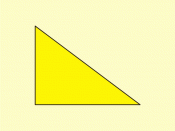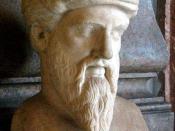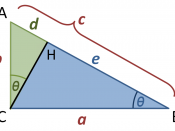Pythagoras was considered to be the world's first pure mathematician. Many European philosophers call him the father of philosophy. Various scientists will call him the father of science. To musicians, nonetheless, Pythagoras is the father of music. Pythagoras was also the founder of the Pythagorean School. According to researchers, very little information is known about him and his life. All that is known of him comes from what was recorded by those he taught.
Pythagoras was born between 530-569 B.C., on the island of Samos in Greece. Pythagoras's father was Mnesarchus from Tyre, and his mother was Pythais, a native of Samos. His mother came from the colonial Greeks of Samos. His father was a merchant and was believed to have brought corn to Samos at a time of famine and was granted citizenship of Samos as a mark of gratitude. Little was known about Pythagoras' physicial attributes because other than fictitious descriptions.
The sole recorded physical description of him that has been agreed upon as fact was that he had a birthmark on his thigh.
Pythagoras traveled frequently with his father. During traveling with his father, Pythagoras was educated by Chaldaeans and other learned scholars in Syria. As a youngster, Pythagoras was interested in music and played the lyre. The lyre was a stringed instrument which is an ancestor of the guitar. It is believed his musical education later contributed to his mathematical studies. It is known that Pythagoras was influenced by three philosophers. They were: Pherekydes, who was one of his teachers, Thales, and Thales' student Anaximander, who lectured about geometry and quite possibly inspired Pythagoras to seek a field in geometry. Pythagoras founded a school of philosophy that focused on math. He had two groups of students, the mathematikoi, who were strict followers of everything...



Sounds Familiar!
Whilst this essay sounds a little too familiar to research sites that I've read on the internet about Pythagoras it was interesting and from what I have researched accurate.
1 out of 1 people found this comment useful.